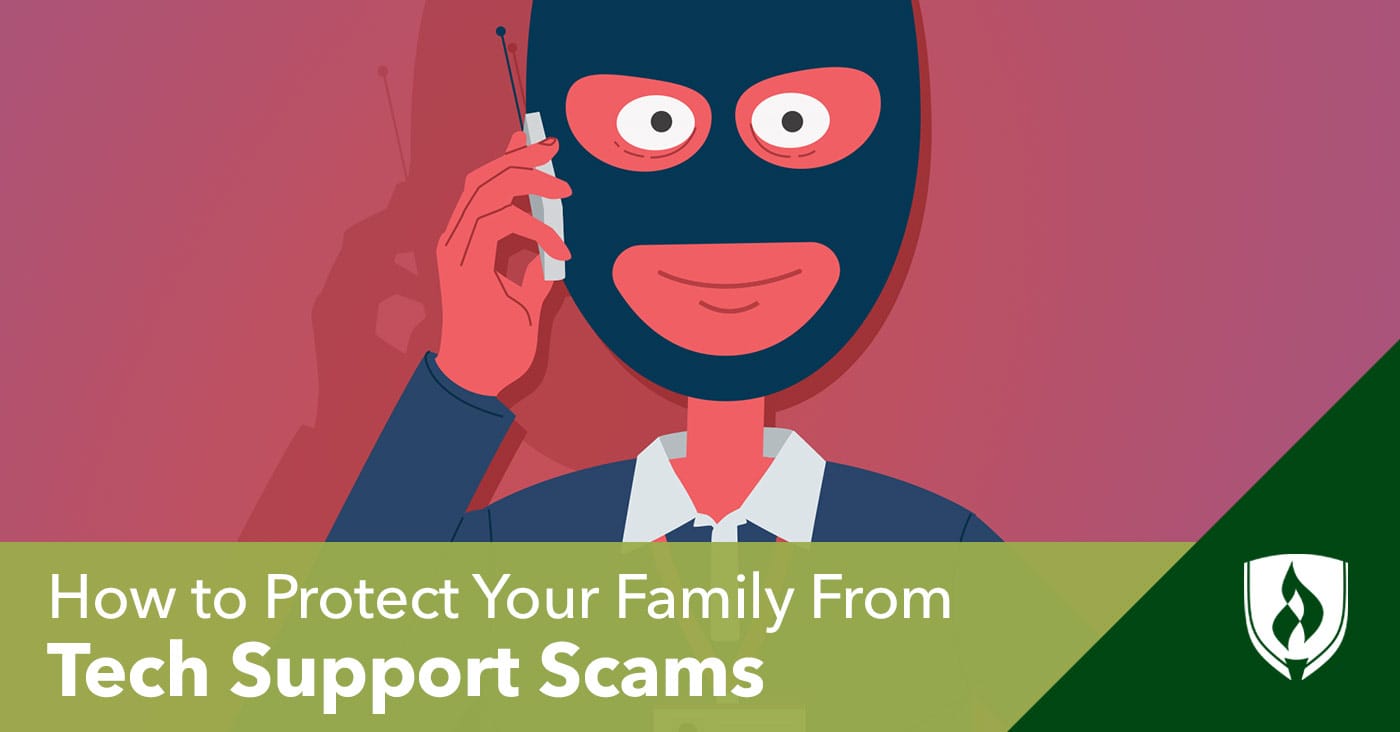What Scammers Don't Want You to Know: How to Protect Your Family from Tech Support Scams
By Will Erstad on 06/26/2017

Con artists, malevolent hackers and scammers: This is not exactly a list of the world’s most popular people. But despite the general scorn directed their way, they’re still going strong. The allure of “get rich quick” schemes is certainly understandable—who wouldn’t want large source of relatively easy money?
One way to rain on their parade is to make their work a lot harder. We achieve this by spreading information to empower the general public. Many of these schemes are highly deceptive and require a careful eye (or ear) to catch on to when something seems fishy.
The more you and your family know about these scams and their devious tactics, the better off we will all be. Keep reading as we highlight some of the eye-opening numbers associated with tech scams, how to spot or prevent them and what to do if you suspect you or your family has been compromised.
How common are these scams?
There’s a lot of money to be made in the business of conning people—particularly elderly people who are typically the most vulnerable and the most targeted. In fact, 57 percent of all fraud complaints tracked by the Federal Trade Commission’s Consumer Sentinel Network in 2015 were attributed to individuals aged 50 and older.
This targeting of older Americans has paid off handsomely for some scammers. According to a report by True Link Financial, elder fraud and financial abuse costs seniors $36.48 billion in 2015 alone. Of that, $12.76 billion is lost to explicitly illegal tactics, such as identity theft.
There’s a clear incentive for dishonest folks to target seniors, and many of the scams and schemes used often appear entirely credible to the average eye. Tech support scams are one popular tactic using this model—a scammer will typically contact their target saying their computer is in need of repairs and will convince them to surrender control of their device which could lead to a number of serious issues. Microsoft estimates 3.3 million users of their products paid a total of $1.5 billion to tech support scammers in 2015.
So what can be done? Unfortunately, as long as the tactics keep working, the scam artists will continue working also. But in order to avoid becoming their next victim, you need to be informed. By informing yourself and your family about the tactics used by these scammers, you can protect yourself while making their lives much more difficult.
Tech Support Scams: The Big Picture
How do you detect a scam?
Despite scammers’ best efforts to disguise their schemes as legitimate messages, there are some telltale signs to help you spot them. Here are a few red flags to be on the lookout for:
- The company initiates contact: If you haven’t reached out for assistance, be very skeptical of any representative who contacts you about urgent repairs or technical fixes for your computer. Legitimate businesses with millions of customers have enough incoming support center calls that they’re not likely to seek out users to help.
- They ask you to install software or surrender control of your device: This is their ultimate goal. Most software, even seemingly innocent or popular antivirus tools, installed by these people will also be accompanied by malicious software that can give them access to login information for any number of sites you visit. Whatever you do, do NOT give an unsolicited “tech support professional” control of your device.
- They insist you have a virus or form of malware that is undetectable: This is just one of many scare tactics designed to get you to react without thinking. Tech support scam artists tend to be persuasive talkers and rely on you letting your guard down. Even if they sound believable, you are always better off hanging up and seeking out the software providers’ official customer service line.
- A pop-up error message instructs you to call a number for assistance: Many scams rely on the user to initiate contact. Typically this happens when they click on a questionable link and get redirected to a site that will generate an urgent, official-looking error message telling them to call a number. Do not follow these pop-ups instructions.
- They ask you for personal information: Names, dates of birth, Social Security Numbers and credit card information are incredibly valuable and there’s never any reason for a “tech support representative” to ask you for them. If they do, it’s an obvious sign of a scam.
Tech Support Scams: How to Detect Them
What should you do if you think you or your family has been scammed?
Scam artists are a crafty bunch, and even the well-informed can be tricked into giving up some of their valuable information. If you suspect you’ve been duped by one of these scams, there are a few simple dos and don’ts that will help minimize the impact.
- Do: Contact your bank or financial institution as soon as possible to inform them. Depending on the institution, they can take measures like issuing new cards, placing security alerts on your accounts and helping with contested charges. Any delay could leave you out of luck.
- Don’t: Leave your computer connected to the internet. Software installed by these scammers may continue to relay information from your device even when you think it’s over. Be sure to unplug any wired connections and disable wireless internet connections.
- Do: Give your friends and family a heads-up. Let them know you believe you may have been compromised and to keep an eye out for any suspicious links or messages coming from you. This can help prevent the spread of malicious software from your device to theirs.
- Don’t: Forget to keep an eye on your accounts, even after some time has passed. A clever scammer may be willing to wait and lull you into a false sense of security before trying to cash in.
- Do: Change your passwords, but don’t rush to do it unless you know your computer is not compromised. It’s no use having a new password if a scammer is monitoring your every move. Make the changes using a different device to be safe.
Tech Support Scams: What to Do If You've Been Tricked
Spread the word
One of the best ways to fight back against scheming scammers and con artists is to spread the truth about their tactics. By following and sharing the tips above you’ll do your part in helping to make their attempts a little more difficult. So go on, spread the word and help guard yourself and your family from tech support scams.
If you like the thought of being a thorn in the side of tech support scammers, you ought to check out our article, "5 Fascinating Infosec Jobs that Help Combat Cybercrime."
Related Articles:
- Social Media Security: 6 Hacking Tricks You Never Thought You'd Fall For
- Hacked Healthcare: Exploring the Growing Importance of Healthcare Cybersecurity
- 6 Impending Cyber Security Threats Holding Our World Hostage
- Computer Programmer vs. Software Developer: Decoding the Differences
- A Parent's Go-To Guide on Internet Safety for Kids




